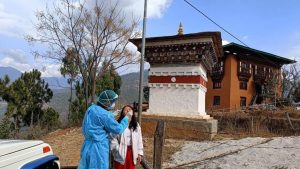Bhutan is among a handful of countries in the world with more than 90 percent of its eligible population fully vaccinated and boosted. The Himalayan kingdom with a little over 750,000 people has lost only nine lives to COVID-19 to date. This is no mean feat for a small country with limited resources.
Not much has changed over the last two years since Bhutan caught international attention through its remarkable handling of the pandemic, despite being resource challenged. Able, informed, and compassionate leadership continues to set the country apart. Bhutan’s prime minister and foreign minister are doctors while the health minister is a public health expert and the incumbent president of the World Health Assembly.
The king of Bhutan, Jigme Khesar Namgyel Wangchuck, has gone above and beyond to protect his citizens. He instituted a National Resilience Fund (NRF) in April 2020 to provide economic relief to Bhutanese impacted by COVID-19. The fund grants monthly income support and loan interest payment support. The support is ongoing, and replenished through the king’s own funds. Prime Minister Dr. Lotay Tshering, in his State of the Nation 2021 report, stated that the fund had offset about $39 million in economic losses. To date, about $52.2 million has been spent supporting 54,000 individuals and more than 100,000 loan account holders from across various sectors impacted by COVID-19. The king has repeatedly said that money can be replaced, but lives cannot.
Besides economic support, the king regularly visits regions affected by COVID-19, inspecting services and providing moral support to frontline workers. The visits are mostly on foot without any VIP comforts. He was already the people’s king, but his benevolence during the pandemic has endeared him even further to his citizens. The most visible proof of this is through the institution of De-suung, a national volunteer program launched by the king in 2011. Before the pandemic, less than a thousand Bhutanese signed up annually. During the pandemic, thousands applied for a spot in one training batch, crashing the website.
Participants in the program, known as Desuups or volunteers, are deployed in times of trouble, disasters, and whenever the need for an extra pair of hands arises. Unofficially dubbed the king’s army, thousands of these volunteers have been serving as frontline workers assisting the armed forces and medical personnel since 2020. During the pandemic, more than 21,000 Bhutanese trained as volunteers. In a historic first, trans women also joined as Desuups. Without these volunteers, successful management of COVID-19 would have been quite impossible.













